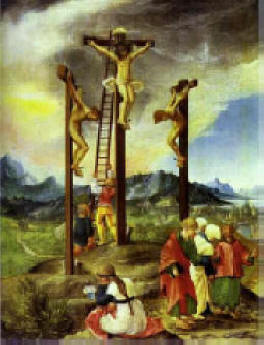One Remarkable Life
"From the beginning his mother knew that he was no ordinary person. Prior to his birth, a heavenly figure appeared to her, announcing that her son would not be a mere mortal but would himself be divine. This prophecy was confirmed by the miraculous character of his birth, a birth accompanied by supernatural
signs. The boy was already recognized as a spiritual authority in his youth; his discussions with recognized experts showed his superior knowledge of all things religious. As an adult he left home to engage in an itinerant preaching ministry. He went from village to town with his message of good news, proclaiming that people should forgo their concerns for the material things of this life, such as how they should dress and what they should eat. They should instead be concerned with their eternal souls.He gathered around him a number of disciples who were amazed by his teaching and his flawless character. They became convinced that he was no ordinary man but was the Son of God. Their faith received
, striking confirmation in the miraculous things that he did. He could reportedly predict the future, heal the sick, cast out demons, and raise the dead. Not everyone proved friendly, however. At the end of his life, his enemies trumped up charges against him; and he was placed on trial before Roman authorities for crimes against the state.Even after he departed this
realm; however, he did not forsake his devoted followers. Some claimed that he had ascended bodily into heaven; others said that he had appeared to them, alive, afterwards, that they had talked with him and touched him and become convinced that he could not be bound by death. A number of his followers spread the good news about this man, recounting what they had seen him say and do. Eventually some of these accounts came to be written down in books that circulated throughout the empire.But I doubt that you have ever read them. In fact, I suspect you have never heard the name of this miracle-working "Son of God." The man I have been referring to is the great neo-Pythagorean teacher and pagan holy man of the first century C.E., Apollonius of Tyana, a worshipper of the Roman gods whose life and teachings are recorded in the writings of his later follower Philostratus in his book,
The Life of Apollonius."
SOURCE:
Bart D. Ehrman. (2011). The New Testament: A Historical Introduction to the Early Christian Writings. Oxford: Oxford University Press,

Apollonius of Tyana
The question, of course, is whose stories came first, those attributed to Jesus or those credited to Apollonius. During the early centuries CE, the followers of both Jesus and Apollonius claimed that the stories told about their leader were the original ones which were later expropriated by their competitor. Christianity seems to have won the argument by default, since Apollonius' followers no longer exist to argue their position. After Emperor Theodosius declared Christianity the official religion of the Roman Empire in 381 CE, the Roman Church eliminated all competing religions, including other versions of Christianity, and continued to do so up until the Protestant Reformation in the 16th century.
Christian authorities were particularly hostile to Mithraism, the official religion of the Roman Empire prior to Christianity, and also accused the followers of Mithras of plagiarizing their beliefs from Christian teachings about Jesus (including beliefs regarding Mithras' virgin birth on December 25th and his resurrection from the dead for the salvation of mankind), even though Mithraism predated Christianity by several centuries (see Mithraism and Christianity). The reality is that such miraculous phenomena were attributed to most gods in the ancient world, including those humans who were believed to become divine upon their death. Indeed, these beliefs were necessary qualifications to be considered divine. Early Christians would have needed to develop similar beliefs about Jesus if Christianity was going to compete effectively with other contemporary religions. Consequently, stories about Jesus, especially those surrounding his birth and resurrection, became increasingly miraculous and mythological over time (cf., The Birth of Jesus).
* * * * *
Of Related Interest:
|
|
|
|
|
|
|
|
|
|
|
Genealogy, Politics and History
|
|
Bill O'Reilly is Killing Jesus
|
|
* * * * *


.jpg)



.jpg)



